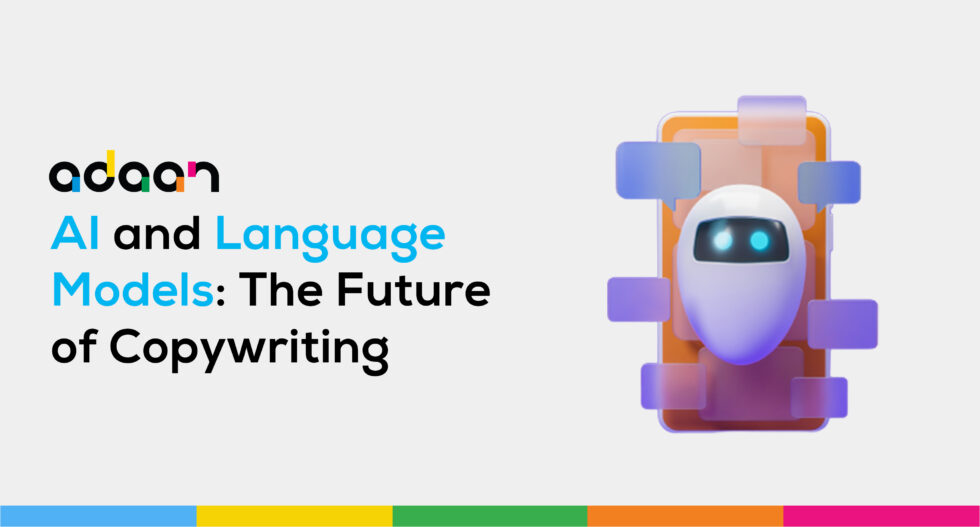AI, the buzzword of our time, is going to shape the future of many industries, including marketing. With the advent of cutting-edge AI language modes such as ChatGPT, the future of copywriting is dramatically transforming.
These technologies are revolutionizing how businesses create and deliver content, with wide-ranging implications across industries. From streamlining content creation in marketing and advertising to optimizing search engine rankings in e-commerce, AI and language models are reshaping the way businesses communicate with their audiences.
The Future of Copywriting with AI and Language Models
From rule-based systems to recent breakthroughs in Natural Language Processing (NLP) and deep learning, Artificial Intelligence (AI) has come a long way. After getting trained on everything present on the internet, language models like ChatGPT have evolved into sophisticated systems that can generate high-quality content with incredible accuracy and efficiency.
The impact of AI and language models on human copywriting is immense, with the potential to save time, enhance customer engagement, and improve brand messaging. As businesses continue to harness the power of AI tools for copywriting, the future looks promising, with exciting possibilities for more efficient, personalized, and engaging automated content creation. In this blog, we will discuss the emergence of AI, the future of AI copywriting, and the role of human copywriters in the age of AI.
The Emergence of Language AI and Natural Language Generation Models in the World of Copywriting
Today, with the help of AI tools for copywriters, it is possible to generate engaging and personalized content that captivates audiences effortlessly. Gone are the days of staring at a blank screen, struggling to develop content ideas or spending hours proofreading and editing. With AI-powered language models, copywriters now have a powerful tool to analyze vast amounts of data, generate creative content, and optimize it for different purposes.
However, this thought might make you think AI tools will soon put copywriters out of their jobs. But that is certainly not true. While these AI tools can be helpful, they cannot replace the expertise of a human copywriter. Here are six reasons why:
- Content Needs a Human Touch: Humans consume a lot of content online, and good copywriters understand how to create content that resonates with human emotions and experiences. Natural Language Processing AI tools still lack empathy, emotional awareness, and sometimes common sense.
- A Bot’s Work Needs Polish: While AI tools for copywriting can generate decent briefs, the content produced often needs editing and requires quality checks to ensure it aligns with the business/brand messaging, SEO optimization, and the page’s intent.
- AI Tools are not Suited for Every Form of Content: AI chatbots struggle to produce persuasive writing, opinion pieces, and long-form content that incorporates a specific tone of voice or brand messaging. They also can’t capture language idiosyncrasies that are effective and relatable to customers. Moreover, they cannot come up with unique ideas or provide a perspective on a topic like human copywriters can.
- Copywriters Understand Strategy: A good copywriter understands a client’s strategic goals and knows how to achieve them from a content perspective. They also better grasp quality factors like E-A-T (Expertise, Authoritativeness, and Trustworthiness), user experience, and social shareability than AI tools for copywriting.
- The Human Mind is Truly Creative: Copywriters have the power to unlock creativity in new and exciting ways that an AI virtual assistant cannot replicate. NLG tools generate content from existing ideas, while humans can come up with original and unique content.
- Copywriters Can Incorporate Primary Research: Copywriters, like traditional journalists, can incorporate primary research into their content, such as expert quotes, interview content, and survey results, which virtual assistants for copywriting cannot generate.
Now that we have established that human copywriters are not completely replaceable by AI, let us look at some of the key benefits of using AI tools for copywriting.
- Increased Productivity: AI chatbots can quickly generate content by analyzing vast amounts of data, saving copywriters time and effort in doing secondary research for the content.
- Enhanced Creativity: Language models can provide ideas that inspire copywriters to create fresh and innovative content that stands out in the online landscape, capturing audiences’ attention.
- Personalization: AI tools for copywriting can analyze user behavior, preferences, and demographics and allow human copywriters to create personalized copy that speaks directly to individual users, creating a connection and boosting engagement.
- Improved Accuracy: Automated content creation models can catch grammar, punctuation, and spelling errors, ensuring the final content is error-free and professional.
- SEO Optimization: AI tools for copywriting can even analyze keywords and optimize copy for SEO, helping businesses create content that ranks higher in search engine results and attracts more organic traffic.
- Cost-Effective: Automated content creation can save costs, reducing the need for extensive manual content creation and editing.
The Future of Copywriting: AI vs. Human Copywriters
Copywriting has always been a crucial element of marketing and advertising. But with the rise of Language AI, artificial intelligence (AI) and Natural Language Processing (NLP) models, the copywriting landscape is rapidly evolving. As businesses seek to streamline content creation processes and harness data-driven insights, AI tools for copywriting have gained traction. However, there are pros and cons to using AI and language models and limitations that must be considered when comparing them to human writers.
So let’s start with the pros of AI tools for Copywriting:
- Efficiency: AI tools for copywriting can generate content quickly and efficiently, saving time for businesses and marketers.
- Consistency: AI chatbots maintain consistency in tone, style, and messaging throughout or across different pieces of content.
- Lower Costs: Using AI tools for copywriting can potentially be more cost-effective in the long run, as it reduces the need for hiring and training human writers.
- Data-Driven: An AI virtual assistant can analyze data and provide insights on content performance, allowing for data-driven optimization and improvement of content strategies.
Now, let us look at the cons of AI tools for Copywriting:
- Lack of Creativity: AI and language models may struggle with originality and creativity as they rely on existing data and patterns to generate content. They may struggle to create unique, creative copy that resonates with human emotions and experiences.
- Contextual Understanding: An AI virtual assistant for copywriting may lack the ability to fully understand context, nuances, and cultural references, resulting in content that feels robotic, irrelevant, or inappropriate.
- Limited Emotional Intelligence: Copywriting often requires understanding and evoking human emotions, and while AI chatbots can mimic emotions, they lack the true emotional intelligence that human writers possess.
- Ethical Concerns: There are ethical concerns around using AI tools for copywriting, such as the potential for biased or discriminatory content, as AI models learn from existing data, which may contain inherent biases.
The Role of Human Copywriters in the Age of AI/Virtual Assistants for Copywriting
With the rise of Artificial Intelligence (AI) and its increasing integration into various industries, including copywriting, there may be concerns about the role of human copywriters becoming obsolete. But as we already discussed, there is no need to get scared! Human copywriters still hold a unique and indispensable value that AI cannot replicate.
Instead of fearing AI will replace human copywriters, we should embrace this technological advancement and adapt to the changing landscape by harnessing its power. AI tools like ChatGPT can be the most powerful tool in the arsenal of copywriters.
AI can automate recurring tasks, such as data analysis and content generation, allowing human copywriters time to focus on what they do best: being creative. By leveraging AI-powered tools, human copywriters can enhance their efficiency and productivity.
What truly sets human copywriters apart is their ability to connect with readers on a personal level. Human copywriters possess the unique talent of understanding human emotions, context, culture, and nuances, which allows them to create content that truly speaks to the hearts and minds of their audience.
They can weave stories, evoke emotions, and spark genuine connections through their words. Human copywriters can also adapt their writing style, tone, and voice to suit the brand personality and target audience, creating authentic, relatable, and impactful content. In the fast-paced age of AI, human copywriters must stay ahead of the curve by continuously developing new skills.
This includes understanding the capabilities and limitations of AI, learning how to use AI tools for copywriting effectively and staying updated with the latest industry trends. Human copywriters can also focus on honing their uniquely human skills, such as creativity, emotional intelligence, critical thinking, storytelling, and problem-solving, which AI cannot easily replicate.
By staying curious, proactive, and adaptable, human copywriters can continue to thrive in the evolving landscape of copywriting in the age of AI. While AI is undoubtedly changing the copywriting landscape, human copywriters still play a pivotal role in crafting personalized content. They can adapt to the rise of AI by leveraging AI tools, bringing their unique human touch to the table, and continuously developing new skills.
Human copywriters hold the key to unlocking the power of creativity in a high-tech world, and their invaluable contributions continue to shape the art and science of copywriting in the age of AI.
Final Words
As we’ve witnessed in this digital era, AI chatbots have unleashed a whirlwind of change in the copywriting field. From automated content creation to optimized SEO strategies, AI has revolutionized the way copywriters approach their craft. Copywriters are now armed with powerful tools to generate content in a snap, giving them more time to focus on strategy and creativity.
But don’t be fooled into thinking that AI tools for copywriting are here to replace human creativity! In fact, there’s a world of potential for a dynamic partnership between AI and human copywriters. While AI can crunch data and generate content, human copywriters bring their unique perspectives, emotions, and storytelling skills to the mix.
In this rapidly evolving landscape, human copywriters need to adapt and evolve. Instead of fearing the rise of AI, copywriters can embrace it as a powerful tool that enhances their creative process. By leveraging AI in their workflow, copywriters can gain insights, improve efficiency, and unlock new levels of creativity. Human copywriters can harness the power of AI to elevate their work, hone their storytelling skills, and craft content that captivates and engages readers like never before.
FAQs
Will AI and language models like ChatGPT replace human copywriters?
While AI chatbots like ChatGPT have significantly transformed the landscape of copywriting, they are not here to replace human copywriters. While AI can generate content quickly and optimize strategies, human copywriters bring unique perspectives, emotions, and storytelling skills that machines cannot replicate.
Human copywriters can infuse content with creativity, empathy, and originality, creating memorable brand stories and connecting with readers on a personal level.
What are the key benefits of using AI and language models for copywriting?
The use of AI and language models in copywriting offers several key benefits.
- It can save time and increase efficiency by automating content generation.
- AI tools for copywriting can provide valuable insights and suggestions for improving content quality, readability, and relevance.
- It can help copywriters streamline their workflow and improve productivity.
- AI-powered tools can aid in content planning, audience analysis, and content distribution, resulting in better content strategies and improved ROI.
How can human copywriters remain relevant in the age of AI?
To remain relevant in the age of AI, human copywriters can adapt and evolve their skill sets. They can leverage AI as a powerful tool to enhance their creative process, gain insights, and improve efficiency. Human copywriters can focus on honing their storytelling skills, bringing unique perspectives, and creating content that resonates with readers on an emotional level.
What are the limitations of AI and language models in copywriting compared to human writers?
While AI copywriting and language models offer significant benefits, they also have limitations in copywriting. AI-generated content can lack the emotional and contextual nuances that human writers can bring to their work. AI may not fully understand cultural references, slang, or tone, leading to content that may sound mechanical or impersonal.
AI also lacks the ability to think critically, exercise judgment, or tap into human emotions, which are crucial in creating content that connects with readers deeply. Additionally, AI may not always capture the latest trends, news, or cultural shifts human writers can bring to their content.
Can AI and language models be used in conjunction with human copywriters for maximum results?
AI copywriting tools can be used with human copywriters for maximum results. Human copywriters can leverage the capabilities of AI to streamline their workflow, gain insights, and improve content quality while infusing their unique creativity and storytelling skills into the content.
AI can be used as a super powerful tool to support human copywriters in content planning, data analysis, and SEO optimization, allowing them to focus on higher-level tasks such as strategy, creativity, and audience engagement. The collaboration between AI and human copywriters can result in optimized, engaging content that resonates with readers at a deeper level.






